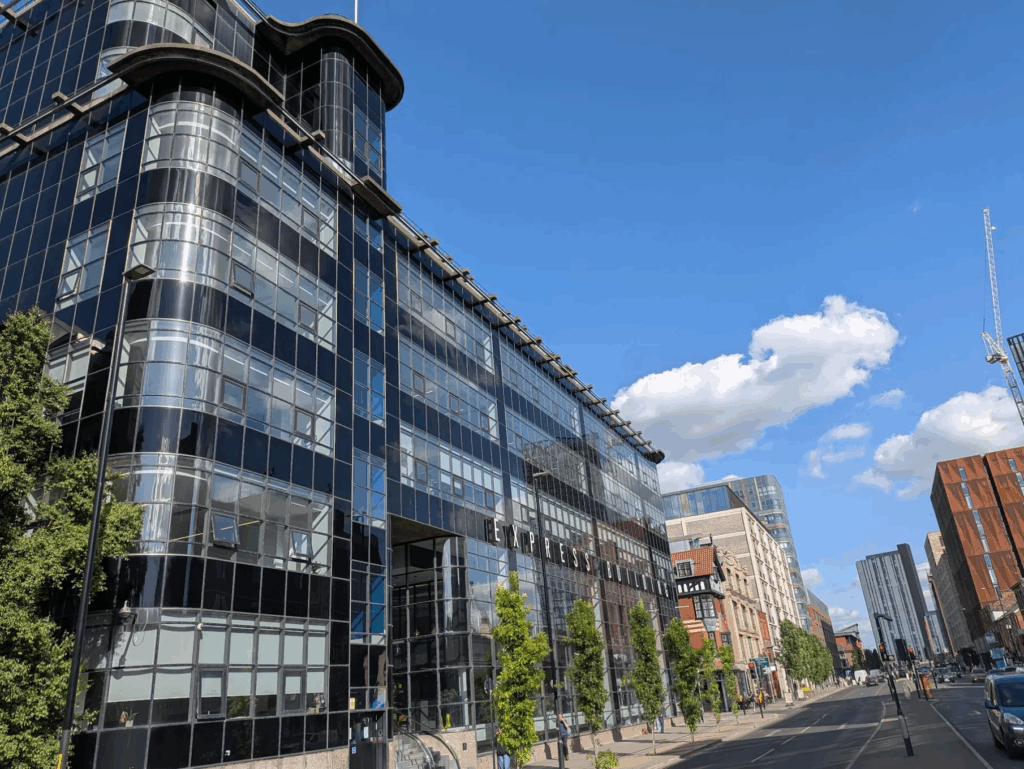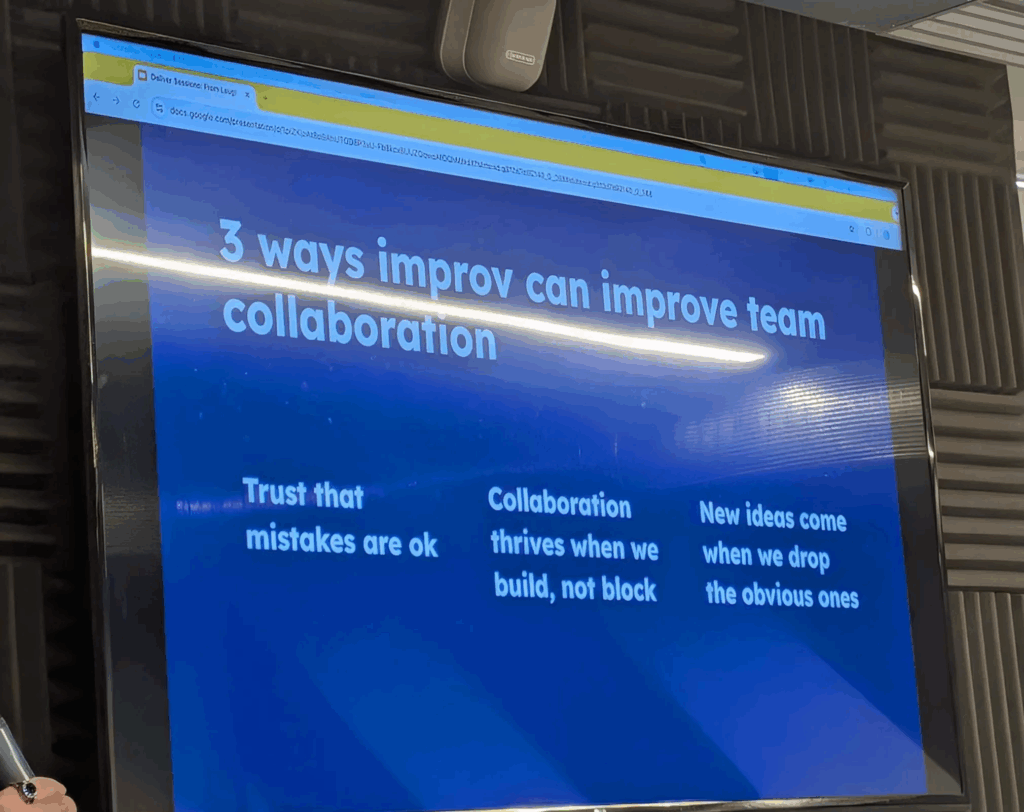
In May 2025 Deliver Sessions meetup was hosted by Transform, and we heard two talks on the theme of “doing things differently”. It was a great turnout: 64 attendees, a post-pandemic record.
This time, we were in the Express Building, a striking building which must have looked space age when it was built in the 1930s.

Laughs to Launches: Improv techniques for team collaboration
Discover techniques to enhance your team’s collaboration and Agile working, using the principles of improv comedy to work together. Jade will take you through her own improv journey — why she started and how it helped her build confidence, and guide you through some exercises in small groups that maximise collaboration. You’ll come away with practical techniques you can use to boost your team’s creativity!
You’ll come away with practical techniques and exercises you can do with your team to maximise collaboration and build a stronger team. Your team sessions will never be the same again!The focus of the session is collaboration — it’s not about putting people on the spot and options are given for participation in the exercises.
– Jade Hanley, product manager
“A confession: I don’t like doing presentations. And I’ve picked a job where you have to do lots of them.”
Jade started her talk by sharing how much stress she felt from needing to present to teams, stakeholders, and others as part of her product management role. She resolved to do something about it, and heard improv classes are meant to help with this kind of thing.
I enjoyed Jade’s story of how improv sounded awful to her, but she looked into it hoping there would be no classes near her — unfortunately it turned out Manchester has a thriving improv scene. She grudgingly signed up for a course, discovered it had an end-of-course showcase on a big stage, and was 100% sure she wouldn’t be taking part in that. Then she showed us a photo of her in the showcase: front of stage, arms wide, absolutely comfortable with it. And her improv experience has hugely helped both with her presentation stress, and with helping her teams collaborate better. Are you tempted to try it out?
Jade guided us through some short, friendly, optional exercises in small groups. I think everyone in the room enjoyed them, it was really well done. And I can see how the confidence-building and collaboration she talked about can come from this.

Jade talked about building trust that mistakes are OK: often people are concerned about what happens if they make a mistake, and hold back for fear of looking foolish. Simple exercises designed to make you “mess up” a little can help reduce this worry, as the group sees everyone making mistakes, everyone having a friendly chuckle about it, and everyone quickly moving on without it being a problem.
She also talked about improv’s tradition of “accepting all offers”: don’t block, dismiss or critique suggestions when your group’s collaborting on ideas. A way to practice this is to respond “yes, and…” to each suggestion, accepting it and building on it to see where it leads. Jade says collaboration thrives when we build, not block: just as people can stay silent for fear of mistakes, they can keep ideas to themselves for fear of them being rubbished.
Both of these remind me of the good psychological safety advice from Jit Gosai’s Deliver Sessions appearance, I can see these improv ideas working for that.
Lastly, Jade explained how the wandering, let’s-see-where-this-takes-us improv approach can lead to some unexpected and creative places. New ideas come when we drop the obvious ones. In another Deliver Sessions link, this fits in well with Agnieszka Katniak’s advice on mastering the problem space, good to have another tool to help groups spend time exploring a challenge.
You can find Jade on LinkedIn.
Building a start up in a traditional enterprise organisation and making it stick
An honest, behind-the-scenes account of Co-op’s digital transformation – from launching a start-up-style digital function inside a 150-year-old organisation, to embedding lasting change. This experience report covers the highs and lows of building a modern engineering culture, delivering real outcomes, navigating politics, and making the transformation stick after the initial hype faded.
– Rob Bowley, product & tech leadership advisor
“This is my story, not the story.”
Rob says this is an important story, and wants more people to talk about it because there’s so many different perspectives. He says he’s seen a lot of attempts at digital transformations in organisations, and this is one of the only ones that’s ever worked.
Rob shared a little about the Co-op’s history: it has its origins with the Rochdale Pioneers of 1844, who founded the modern co-operative movement that’s hugely active across the world. A favourite stat is that it’s older than the state of California.
It’s been through many changes in its long history, and the part Rob was involved in started in 2015 when the team that founded the Government Digital Service (GDS) joined the Co-op to start Co-op Digital. You can follow some of the story on the Co-op Digital blog. Digital was completely separated from the main Co-op, with delegated authority to try something different.
Rob’s background had been mainly in startups and smaller companies, but he was a huge fan of GDS’s work and agreed to move to Manchester as head of engineering. He says when he arrived he found a tiny handful of permanent engineers, and around 150 more from every consultancy going. He found lots of excitement and ambition, with an amzing number of initiatives being kicked off and a range of interesting approaches he hadn’t used before — like service design — and a range of wonderful, talented colleagues, some brand new to Co-op and others who’d moved to Digital after years at the company.
Rob’s first aim was to build the Digital Engineering function.
- Digital had lots of freedom to make its own processes, but Rob tried hard to align with the main Co-op.
- Various people in the main Co-op trusted large enterprise approaches, with lots of long formal documents and lengthy governance steps, and viewed Digital as “hipsters” who wouldn’t build things well. Rob wanted to prove them wrong.
- He reduced the number of technologies in use, created development standards, introduced engineering health checks and more. They ensured things like security and architecture were clearly taken seriously.
- He also worked to build the culture in engineering and across Digital, building a new recruitment process (”The quality of the people matter more than anything else. If you can’t get that right, you can’t do anything”) and communities of practice (”Mega CoP was like a mini conference once a month. Brilliant people, sharing ideas”).
The team achieved lots, taking a wide range of new services nationwide. Rob then moved onto his next aim: keeping this going, keeping the momentum, and making change stick. This phase really started when the GDS people who’d set up Digital left, much sooner than expected — Rob said they’d been a defence against the wider group, advocating for Digital being separate and letting them do things differently. Rob says that was essential to get things started — “they’re brilliant at punching a hole through a problem” — but it was never going to be the answer long term. Rob’s open intention: “We succeed when we no longer need Digital”.
Rob and others started really engaging with the wider org:
- Rob asked the CIO, from a very “big enterprise” background to mentor him. Rob really did learn a lot about how this kind of org works, as well as getting a chance to explain his perspectives.
- Digital teams took architecture review boards very seriously, always turning up thoroughly prepared and being held up as examples of how to engage with the process. Rob’s proud of getting to help shape the whole org architecture principles, making them wonderfully clear and simple rather than stacks of documents.
- Worked closely with a range of wonderful, supportive people to change the Co-op … but also found many others just wanted Digital to go away, blocking things at every turn.
- And when a pan Co-op org transformation came up, Rob made himself integral to it, pushing through incredibly wearing situations and finally helping things get to a better place.
In the end, Rob felt there was a lasting change to culture both in Technology and in the wider Co-op: “the whole tone of the org fundamentally changed”. There’s lots he would have done differently and the whole multi-year experience took a lot out of him, but he’s glad to have been part of it.
You can find Rob on LinkedIn and robbowley.net.
More from the meetup
We run the meetup every 2–3 months, somewhere around Manchester city centre. You can sign up to follow the meetup if you’d like to get notified of future dates. And do get in touch if you might like to give a talk or run a workshop there, it’s a very welcoming crowd.
To pass the time until new dates appear, you might like to read about some past sessions: Deliver Sessions archives.
Leave a Reply